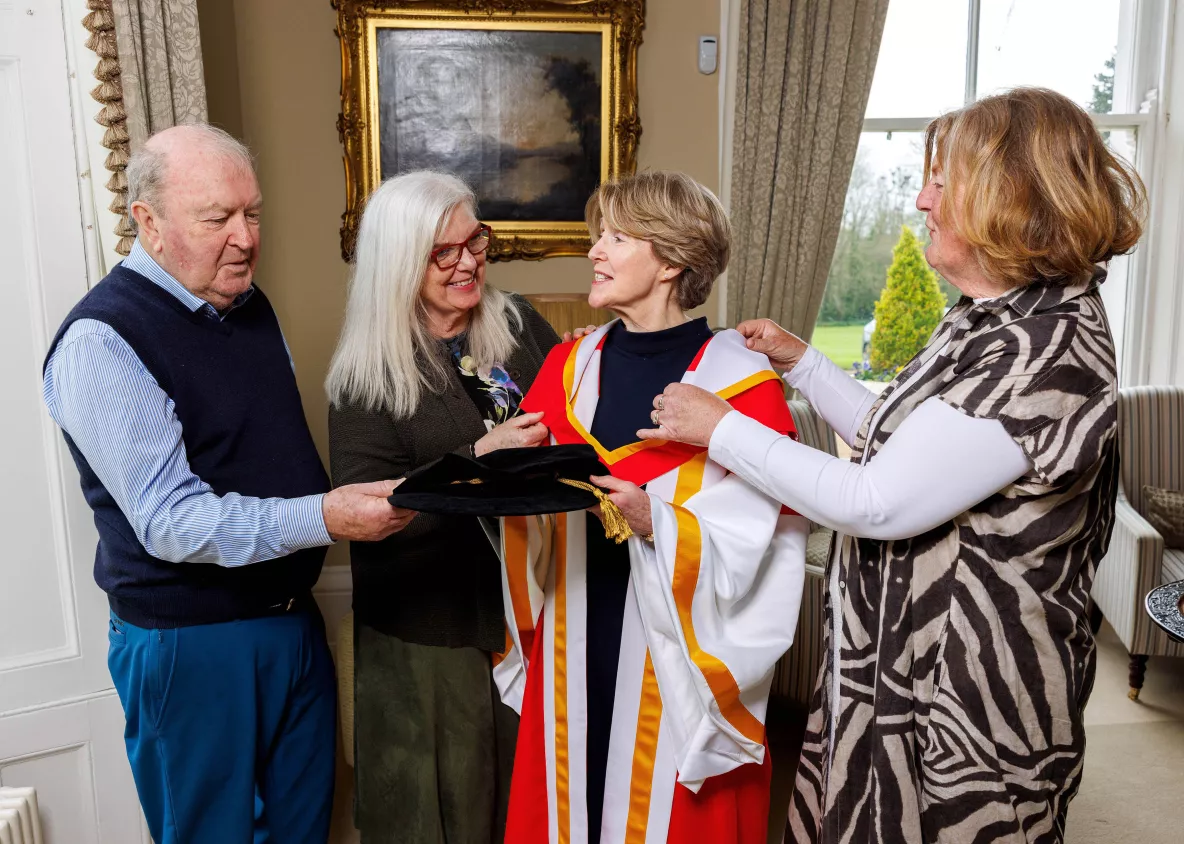
An internationally acclaimed musician has received a posthumous honorary doctorate award from University of Limerick.
Michael (Mick) Moloney, who passed away in 2022, was a musician, academic, teacher and social activist and, for much of his life, one of the most influential Irish musicians in the United States.
He was posthumously conferred with an honorary doctorate of letters by UL President Professor Kerstin Mey at a ceremony in UL this Tuesday.
The Limerick born musician had a longstanding relationship with the Irish World Academy of Music and Dance at UL, where the ceremony featuring members of his family took place.
Speaking at the ceremony, attended by Mick’s sisters Violet, Nanette and Kathleen and his brother Dermot, as well as invited guests, former colleagues and friends, Professor Mey paid tribute to “one of Limerick’s finest sons”.
“In the presence of his beloved family, we pay tribute to Mick Moloney’s extraordinary contributions to music, culture, and education, both locally here at the Academy he loved so much and globally through his collaborations and wide-ranging curations.
“As we reflect upon Mick’s illustrious career and his profound impact on the world of music, it is fitting that we do so within the walls of the Irish World Academy of Music and Dance here at University of Limerick.
“It was here, 30 years ago, that the seeds of great legacies were sown, as the Academy opened its doors as a beacon of academic and performance excellence, dedicated to the celebration and preservation of music and dance.
“Mick’s relationship with the Irish World Academy was one of deep resonance and mutual admiration. Alongside the Academy's founder, Mícheál Ó Súilleabháin, Mick shared a passion for nurturing emerging musicians and dancers, not only within the realm of traditional Irish music but also at the intersections of diverse musical traditions from around the globe.
“His tireless dedication to mentoring students, sharing his expertise, and promoting cultural exchange enriched the fabric of our academic community and inspired countless aspiring artists – in many ways, his presence and influence were deeply felt, leaving an indelible mark on generations of students and faculty alike.”
A consummate singer and instrumentalist (guitar, mandolin, banjo), Mick Moloney was named best tenor banjo player in America four times by FRETS magazine, and in 1999, he was named traditionalist of the year by the Irish Echo.
In 2013, the Limerick man received the Presidential Distinguished Services Award from the President of Ireland, Michael D Higgins, and in 2014, he received a TG4 Gradam Ceoil Award for his outstanding contribution to traditional music.
Mick was particularly influential in the development of the Academy’s traditional music programmes, acting as one of the earliest international consultants for the MA in Irish Music Performance programme.
Over the years, his relationship with the Academy embraced many roles, including visiting lecturer, performer, consultant, external examiner, external supervisor and, finally, adjunct professor. He played an important part in many performance events at UL, most notably in his curation of the Banjaxed concert in 2007, which featured all the leading Irish banjo players of the day.
Mick studied economics in University College Dublin before becoming a major figure in the ballad-group movement of the 1960s, when he joined The Johnstons with fellow musician Paul Brady. Moloney recorded several albums before moving to the United States in 1973, where he pursued graduate studies in the Folklore and Folklife Department of the University of Pennsylvania and earned a doctorate on continuity and change in Irish music in America.
He played a seminal role in the revival of Irish music in America. He was one of only 10 Irish musicians resident in the United States to have received the National Heritage Fellowship Award, presented to him by Hilary Clinton in 1999.
A regular lecturer in ethnomusicology, folklore and Irish studies, Mick Moloney taught at the University of Pennsylvania and was appointed Global Distinguished Professor of Music and Irish Studies at New York University, bringing music into the heart of Irish studies in America in the process.
His scholarship and passion for traditional and folk music was matched by a lifelong commitment to social justice.
As a young man, he worked with immigrant communities in London, and over the last two decades of his life, he worked in Vietnam, Cuba and Myanmar and in refugee camps on the Thai-Burmese border. In these latter years, he divided his time between New York and Thailand, where he volunteered as a music teacher for children with HIV at the Mercy Centre in Bangkok.
His immense legacy as a musician, educator and social justice activist positions him as a global leader in inclusive music practices, a legacy that continues to grow through his students and creative collaborators around the world.